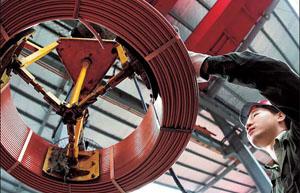
CCTV anchor Rui Chenggang is famous for asking witty and sharp questions. [Photo/China Daily]
BEIJING - US President Barack Obama might not be the only one who needs to worry about how his words could be interpreted - so too might Rui Chenggang, a star anchor from China Central Television (CCTV).
At a news conference after the G20 meetings in Seoul on Friday, the reporter became the only one from an Asian country to pose a question for the US president.
Rui asked Obama how he addressed people's various interpretations of his or his administration's policies - interpretations that may differ from his intentions.
 New energies to lead copper growth
New energies to lead copper growthWhen no reporters from the Republic of Korea (ROK) rose, Rui seized the chance and said: "I'm actually Chinese but I think I get to represent the entire Asia."
After some banter, Obama balked at taking Rui's question and repeated that he was asking for one from the ROK media. When once again no one took up Obama's offer, Rui continued with his question.
The video clip of the incident became a hit online and Rui immediately found himself doing spin control when Chinese netizens started to put their own interpretation on Rui's words and actions.
Some questioned whether he could represent all of Asia and who gave him the authority to speak on their behalf.
Meanwhile, Rui's supporters, which far outnumber those who oppose him, argued that as a journalist he had to fight for every opportunity to ask questions.
According to an online survey conducted by news portal Tencent, 96 percent of netizens said they supported Rui. The rate was 81 percent at sina.com.cn, another portal, by 4 pm on Monday.
"It was the first time that the G20 was held in Asia and somewhere out of the G8 member countries. It would be a shame if there was not a single voice from the Asian media at the US president's press conference," Rui wrote on his blog at sina.com.cn on Saturday.
"In order to save the moment and also to seize the opportunity to speak for the emerging market countries, I raised my hand."
The reporter considered the media splash a result of cultural differences between the Asian and the Western media.
"It's no big deal to raise a question for the US president, who is used to taking various questions from reporters on any occasion," he said on Sina Weibo, China's equivalent of Twitter, and his personal blog.
"It's only that we Asian journalists are more timid compared to our Western counterparts who usually dominate the questioning session at international conferences."
Rui, 33, started another firestorm on his blog three years ago when he criticized the presence of a Starbucks coffee shop in the Forbidden City.
His claim that the modern commercial brand went against the historical atmosphere in the ancient imperial palace soon gained public support, which eventually pushed the American brand out of the site.
Rui, born and raised in Hefei, capital of Anhui province, has been with CCTV since his graduation from China Foreign Affairs University in 1999 and has since become a celebrity in China.
From 2005 to 2006, he attended Yale University as an outstanding youth leader, where he was nominated as the university's youngest ever World Fellow.
As director and anchor of BizChina, the prime-time daily business show on CCTV International, Rui enjoys a large following among Chinese netizens with his frequently updated personal blogs mainly on financial issues and interviews with movers and shakers.
The English-fluent anchor has conducted face-to-face interviews with hundreds of global business leaders, economists and officials, including Microsoft founder Bill Gates.
Rui didn't respond to the question of whether he was eligible to "represent the entire Asia", though many others took his side, saying it is understandable for him to say something like that under the circumstances.
But he did recall an anecdote the night before he headed for the G20 conference when he was receiving the Golden Microphone Award, China's top honor for anchors.
"The presenter asked me what I'd like to ask the US president," he said. Since he thought he would not have the chance, "it came as a nice sign."





